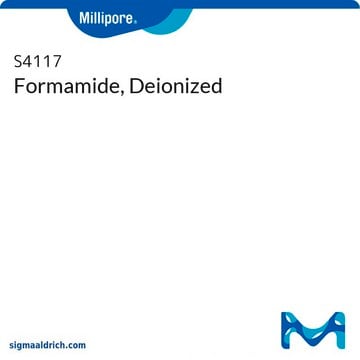F7503
Formamide
ReagentPlus®, ≥99.0% (GC)
Synonym(s):
Amide C1, Formic amide
About This Item
Recommended Products
vapor density
1.55 (vs air)
Quality Level
vapor pressure
0.08 mmHg ( 20 °C)
30 mmHg ( 129 °C)
product line
ReagentPlus®
Assay
≥99.0% (GC)
form
liquid
autoignition temp.
932 °F
expl. lim.
2.7-19 %
technique(s)
hybridization: suitable
refractive index
n20/D 1.447 (lit.)
pH
4-10 (20 °C, 200 g/L)
bp
210 °C (lit.)
mp
2-3 °C (lit.)
density
1.134 g/mL at 25 °C (lit.)
SMILES string
NC=O
InChI
1S/CH3NO/c2-1-3/h1H,(H2,2,3)
InChI key
ZHNUHDYFZUAESO-UHFFFAOYSA-N
Looking for similar products? Visit Product Comparison Guide
General description
Application
- To synthesize tetrakis(trialkylsilyl) diphosphate by reacting disodium dihydrogen diphosphate with trialkyl chlorosilane.
- In Cu/C catalyzed cycloaddition between azides and terminal alkynes to synthesize triazoles.
Legal Information
Not finding the right product?
Try our Product Selector Tool.
Signal Word
Danger
Hazard Statements
Precautionary Statements
Hazard Classifications
Carc. 2 - Repr. 1B - STOT RE 2 Oral
Target Organs
Blood
Storage Class Code
6.1C - Combustible acute toxic Cat.3 / toxic compounds or compounds which causing chronic effects
WGK
WGK 1
Flash Point(F)
305.6 °F
Flash Point(C)
152 °C
Certificates of Analysis (COA)
Search for Certificates of Analysis (COA) by entering the products Lot/Batch Number. Lot and Batch Numbers can be found on a product’s label following the words ‘Lot’ or ‘Batch’.
Already Own This Product?
Find documentation for the products that you have recently purchased in the Document Library.
Our team of scientists has experience in all areas of research including Life Science, Material Science, Chemical Synthesis, Chromatography, Analytical and many others.
Contact Technical Service



